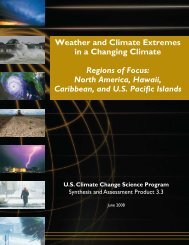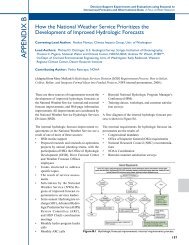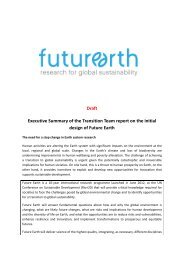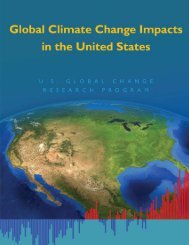Book 2.indb - US Climate Change Science Program
Book 2.indb - US Climate Change Science Program
Book 2.indb - US Climate Change Science Program
- No tags were found...
Create successful ePaper yourself
Turn your PDF publications into a flip-book with our unique Google optimized e-Paper software.
The U.S. <strong>Climate</strong> <strong>Change</strong> <strong>Science</strong> <strong>Program</strong> Chapter 500.1200 0350 0.05–1increasing evidence for accelerated warming,enhanced precipitation, and widespread permafrostthaw which could lead to an expansion ofwetland areas into organic-rich soils that, giventhe right environmental conditions, would befertile areas for methane production.A prominentconcern aboutmarine methanehydrates is thatwarming at theEarth’s surface willultimately propagateto hydrate depositsand melt them,releasing methaneto the oceanatmospheresystem.10–25 550 8–60050–110150800810 50–2500840905 150–5000Figure 5.8. The firn column of a typical site ona polar ice sheet from Schwander, 2007; reprintedwith permission from Encyclopedia of Quaternary<strong>Science</strong>. Abbreviations: m, meter; kg m –3 , kilogramsper cubic meter.3.2 Destabilization of PermafrostHydratesHydrate deposits at depth in permafrost areknown to exist, and although their extent isuncertain, the total amount of methane inpermafrost hydrates is very likely much smallerthan in marine sediments. Surface warmingeventually would increase melting rates ofpermafrost hydrates. Inundation of some depositsby warmer seawater and lateral invasionof the coastline are also concerns and may bemechanisms for more rapid change.3.3 <strong>Change</strong>s in Wetland Extent andMethane ProductivityAlthough a destabilization of either the marineor terrestrial methane hydrate reservoirs isthe most probable pathway for a truly abruptchange in atmospheric methane concentration,the potential exists for a more chronic, butsubstantial, increase in natural methane emissionsin association with projected changes inclimate. The most likely region to experience adramatic change in natural methane emissionis the northern high latitudes, where there isIn addition, although northern high-latitudewetlands seem particularly sensitive to climatechange, the largest natural source of methane tothe atmosphere is from tropical wetlands, andmethane emissions there may also be sensitiveto future changes in temperature and precipitation.Modeling studies addressing this issue aretherefore also included in our discussion.4. Potential for AbruptMethane <strong>Change</strong> FromMarine Hydrate Sources4.1 Impact of Temperature <strong>Change</strong>on Marine Methane HydratesA prominent concern about marine methanehydrates is that warming at the Earth’s surfacewill ultimately propagate to hydrate depositsand melt them, releasing methane to the oceanatmospheresystem. The likelihood of this typeof methane release depends on the propagationof heat through the sea floor, the migration ofmethane released from hydrate deposits throughsediments, and the fate of this methane in thewater column.4.1.1 Propagation of Temperature<strong>Change</strong> to the Hydrate Stability ZoneThe time dependence of changes in the inventoryof methane in the hydrate reservoir dependson the time scale of warming and chemicaldiffusion. There is evidence from paleotracers(Martin et al., 2005) and from modeling(Archer et al., 2004) that the temperature ofthe deep sea is sensitive to the climate of theEarth’s surface. In general, the time scale forchanging the temperature of the ocean increaseswith water depth, reaching a maximum ofabout 1,000 years for the abyssal ocean. Thismeans that abrupt changes in temperature atthe surface ocean would not be transmitted immediatelyto the deep sea. There are significantregional variations in the ventilation time ofthe ocean, and in the amount of warming thatmight be expected in the future. The Arctic isexpected to warm particularly strongly because178






